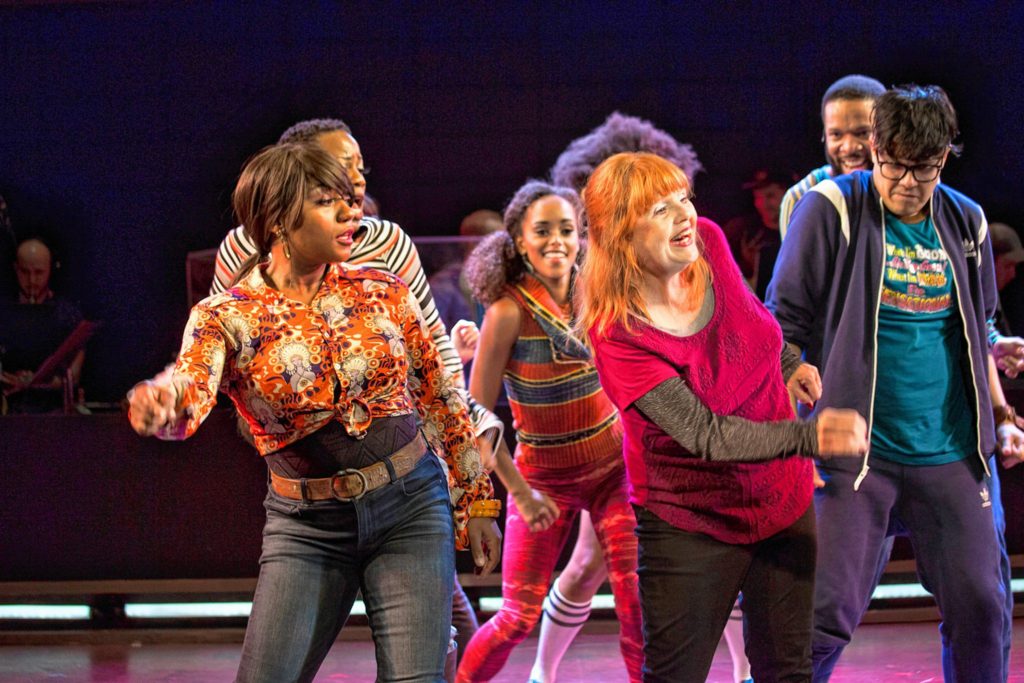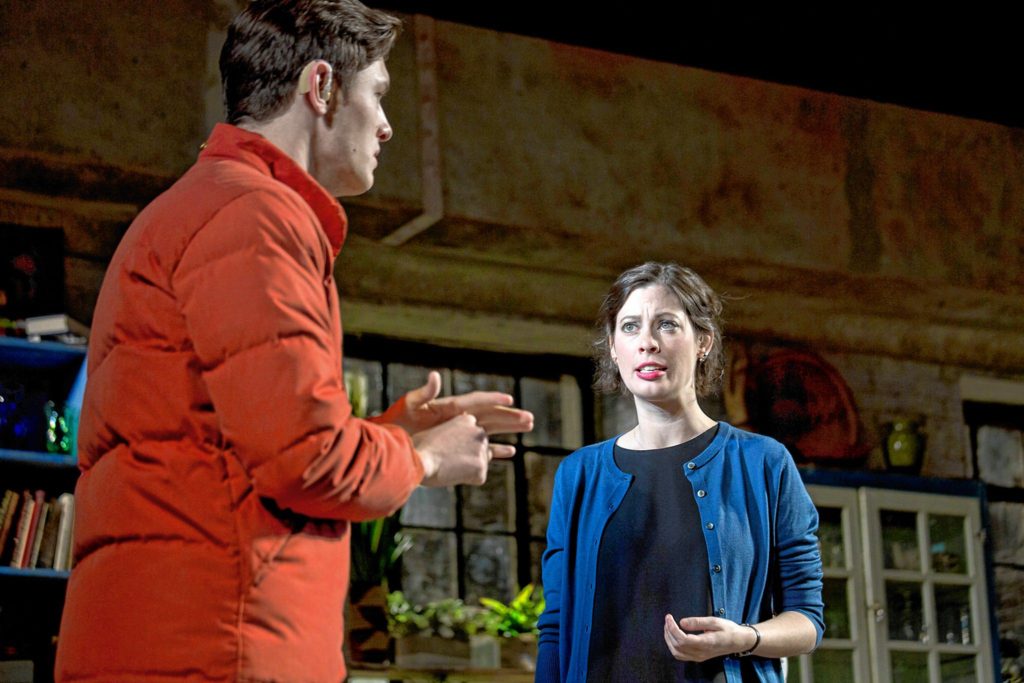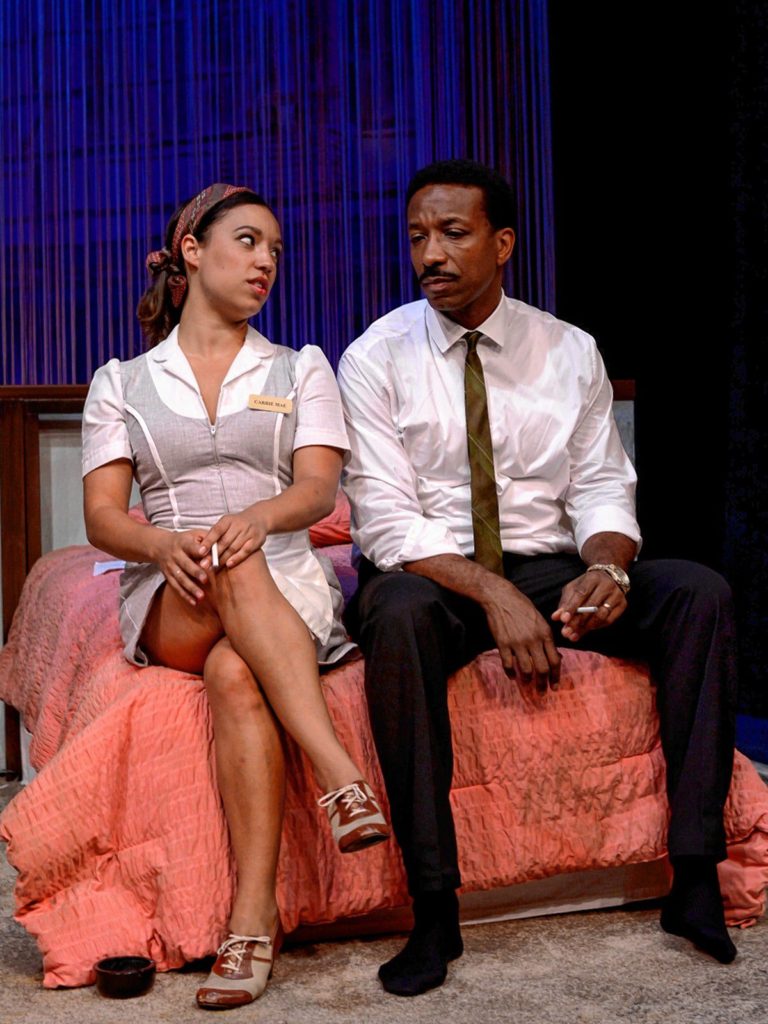The Valley’s summer theaters have folded their figurative tents, but looking west, the season isn’t quite over. Out toward the Berkshires, five troupes are still up and running through this weekend and beyond.
Chester Theatre Company’s season closer is The Mountaintop, a brief historical fantasy by Katori Hall. It takes place on an April midnight in 1968, in Dr. Martin Luther King, Jr.’s motel room in Memphis where, tomorrow morning, he will be assassinated. When a pretty young chambermaid brings him a cup of room-service coffee, a circling destiny begins to unfold. She returns his flirtations, shares a cigarette along with impertinent opinions on his ethics, strategies and rhetorical style, then delivers a revelation that launches the play into another realm — literally.
In Collette Robert’s well-tempered production, Jordan Mahome doesn’t attempt a vocal or physical impersonation of the great man — but that’s as it should be, since this is a private and ultimately interior portrait, which Mahome performs with subtlety and grace. Shelley Fort, as the puzzling interloper, is by turns coy and seductive, mocking and challenging, recognizing the all-too-human sinner while encouraging his better angels.
Another two-hander, which I haven’t seen yet, plays through this weekend at the Berkshire Theatre Group’s Unicorn Theatre. Kate Baldwin and Graham Rowat, the real-life couple who starred in last summer’s song-and-dance Bells Are Ringing, return to BTG in Nick Payne’s Constellations, a quantum romance about a high-powered physicist and a humble beekeeper caught in a recursive series of first meetings.
Running into September at Barrington Stage Company is Broadway Bounty Hunter, the hands-down bizarrest show I’ve seen all summer. It’s a cheerfully shameless show-biz parody whipped into a send-up of ’70s Blaxploitation and martial arts flicks. Annie Golden plays an actress “of a certain age” named Annie Golden who is pissed off at having to compete for roles with “catty 20-year-old chorus girls.” She is recruited and trained by the obligatory Asian Kung Fu master (Scott Watanabe) to capture a megalomaniac drug kingpin who’s hatching a nefarious scheme to take over … Broadway.
And it’s a musical, the product of Barrington’s 10-year-old Musical Theatre Lab. With a score by Joe Iconis and script by Iconis, Lance Rubin and Jason SweetTooth Williams, the show gleefully exploits every musical, lyrical, sartorial and choreographic cliché, performed by a joyously hardworking ensemble. Golden, who resembles a cute, tenacious chipmunk, makes up in pizazz what she’s lost in vocal range. Alan H. Green is a Shaftian action hero who’s afraid of his feelings, and Barrington favorite Jeff McCarthy is the villain, borrowing Sam Elliott’s mustache and Richard Roundtree’s surname.
Up the street at Barrington’s mainstage venue is Tribes, a family drama with a difference by English playwright Nina Raine. Billy, born deaf, lives in a hyperarticulate, loudly argumentative family whose members define themselves by language and sound and who have taught him to speak and lip-read. When Billy meets Sylvia, who is gradually losing her hearing, he begins to learn sign language and is introduced to the deaf community he’s never been part of.
The script is a bit schematic, its characters and circumstances too illustrative of various points on the playwright’s compass. Billy’s father and mother are writers, sister Ruth is an aspiring opera singer, and brother Dan is hearing voices in his head. But it’s a pretty unsparing look at deafness from inside and out, including a critique of deaf politics. The cast is terrific, and none more so than Joshua Castille, who really is deaf, as Billy, and Eli Pauley, who really is hard-of-hearing, as Sylvia.
The 75-year commitment of Jacob’s Pillow to African and African-American dance has been much in evidence this summer. This season-closing week, Souleymane Badolo joins with fellow West African dancer Sylvestre Koffitse Akakpo-Adzaku and master drummer Mamoudou Konate in Yimbégré: Replanting Roots in the Name of Freedom, a program that blends contemporary movement with African traditions and history.
Last week the Pillow presented Flexn, an electrifying showcase of the hip-hop-derived street dance known as Flex, created by a pair of unlikely collaborators: Flex inventor Reggie “Regg Roc” Gray and the adventuresome director Peter Sellars. The piece was both a showcase for this multivalent form and a visceral response to the epidemic of violence in black communities – self-inflicted bloodshed as well as police murder. The 16 performers are not only jaw-droppingly athletic and, well, flexible, they are intimately connected to – indeed, part of – the world they are reflecting. This is not self-contained abstract movement or pure aesthetic exploration, but dance that is about more than itself, grown from and immersed in the state of the real world.
Shakespeare & Company, as always, has the summer’s longest and most crowded program. Four of this season’s nine productions are still running — Shakespeare’s early romantic comedy The Two Gentlemen of Verona and three contemporary dramas with women at the center: Annette Miller in Sotto Voce, about history, memory and Jewish identity; Christianna Nelson in Ugly Lies the Bone, about a wounded warrior’s homecoming; and Tod Randolph in Or, about the author, voluptuary and spy Aphra Benn.
Coda: Williamstown Theatre Festival ended its season last weekend with two strong productions of disappointing scripts, each of them focused on a determined woman — one of them approaching the peak of her life’s ambitions, the other at the end of her life’s options.
In Wendy Wasserstein’s An American Daughter, smart, ambitious Lyssa (Diane Davis) is nominated to be U.S. Surgeon General, only to be tripped up by a long-ago misdemeanor, an offhand remark made on national television and, of course, sexism. Although the 20-year-old play rings with echoes of a certain woman currently seeking high office, it’s inescapably dated, propelled by unlikely dramatic contrivances and stocked with shorthand characters representing topical issues and positions.
Tom Holloway’s intimate one-act And No More Shall We Part finds a devoted long-married couple facing the wife’s oncoming death from an incurable disease, she with a fixed determination to take her own life before things get “horrible,” he in cycles of denial. In Anne Kauffman’s taut production, Jane Kaczmarek and Alfred Molina enhanced the closely observed but surprisingly repetitive script with two of the summer’s most finely woven performances.
Contact Chris Rohmann at stagestruck@crocker.com.






